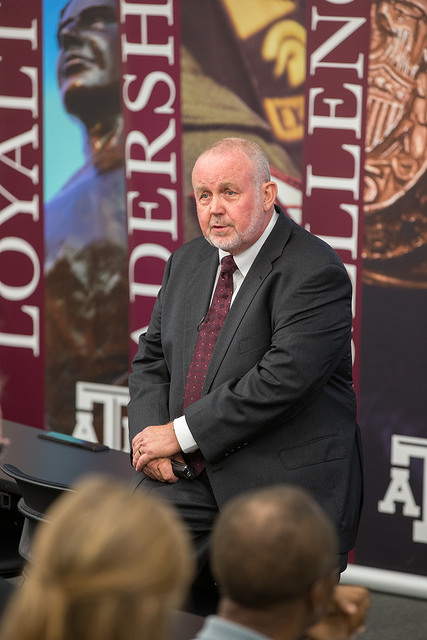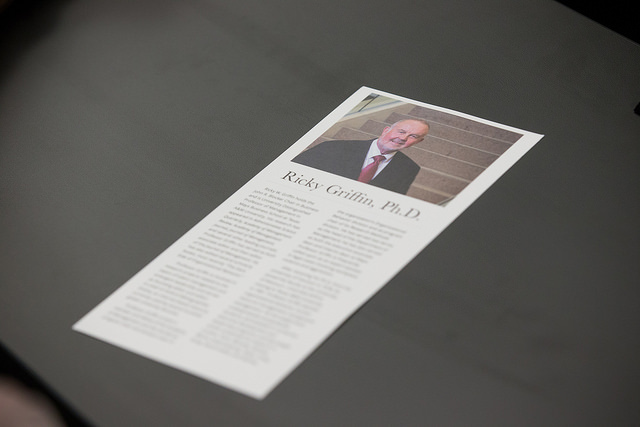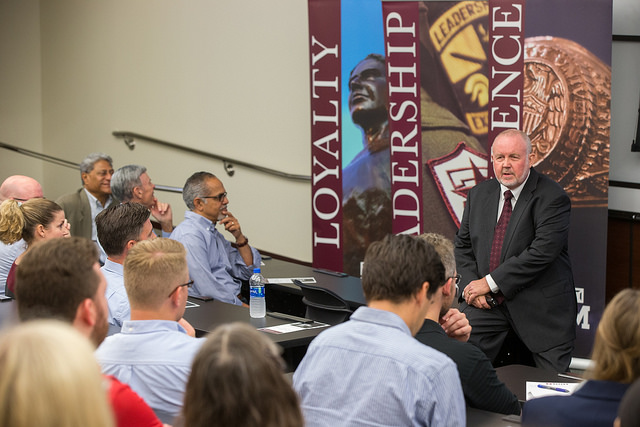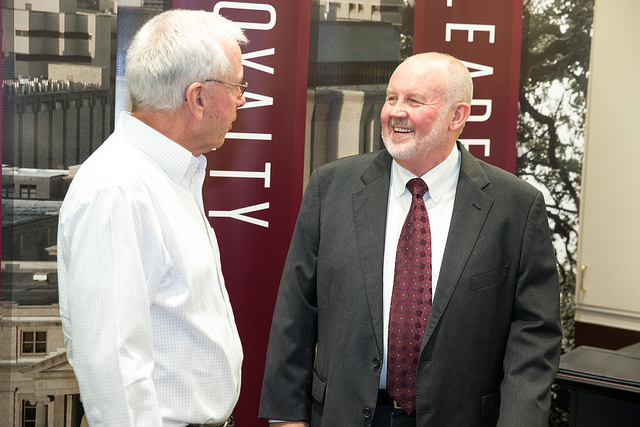Griffin, a self-described “accidental scholar,” receives Mays’ Lifetime Achievement Award
September 26, 2018
|
Dorian Martin
Ricky Griffin didn’t plan to have an academic career. Therefore, Mays Business School’s Lifetime Achievement Award for Research and Scholarship wasn’t an honor he anticipated receiving.
He now is among a handful of Mays’ legendary scholars who have received this prestigious award. “The Lifetime Achievement Award is rarified air,” said Mays Dean Eli Jones during a Sept. 14 ceremony marking Griffin’s honor. “It’s the highest honor that Mays Business School gives.”
Griffin put his selection to receive the award into perspective. “When I’ve attended these award presentations in the past, I’ve always been in awe when I hear people talk about the intentionality with which they chose to become a scientist,” he said. “They talk about the time when they wanted to become a professor. They knew they wanted to study finance or marketing or management because they were interested in this topic. I’m in awe because nothing like that happened to me. I became a scholar truly by accident.”
Yet, Griffin’s impressive body of work over his 40-year career sets him apart. He helped frame discussions in a diverse range of research areas, including job characteristics, work design, emergent leadership, social information processing, and workplace violence and aggression. He also served in administrative roles where he strived to work collaboratively to create policies and programs that would enhance Mays standing in the academic community.
Breaking the mold
Griffin, who was born with a physical limitation, came from a family where individuals left school after eighth grade to go to work. “I was brought up to believe that I needed to get an education because I probably wouldn’t be able to do physical labor,” he said.
He soon found that he enjoyed school. After graduating from high school, Griffin went on to earn a bachelor’s degree in business administration from North Texas State University. He then decided to enroll in the University of Houston’s MBA program.
While in graduate school, Griffin had the opportunity to teach a non-credit course at the College of the Mainland in Texas City. “I found that experience to be fun and rewarding, and I seemed to have a knack for teaching,” he said. Soon, University of Houston faculty members encouraged Griffin to consider teaching at the university level, so he remained at the institution to earn his Ph.D.
Finding a new path

As a newly minted doctoral student, Griffin attended his first doctoral seminar taught by John “Jack” M. Ivancevich, a renowned researcher in organizational behavior and management. “My expectation was that I was studying to become a teacher, but Jack was a world-class scholar,” Griffin said. “I walked into class that first semester on the first day and Jack started talking about these things called journals. I’m not making this up – I sat there in that room and thought, ‘Is he talking about The Wall Street Journal or Ladies’ Home Journal?’ Those were the only two publications I knew of that had the name journal in the title. That afternoon I went to the library and I found there were all these other things called journals.”
That seminar proved life-changing in other ways. Ivancevich required his students to do a field research project where they had to collect and analyze data and then write a paper with the findings. “At that point, I had not taken a research methods course. I didn’t know what research methods meant,” Griffin remembered. “And I hadn’t taken any statistics beyond basic stats. I really felt like I was over my head.”
Griffin decided to study whether employee and customer perceptions of workplace climate varied between large and small organizations. He chose two banks of differing sizes and opted to survey customers as they entered the bank. Griffin approached his first potential research subject, a man who had just completed his shift at a nearby oil refinery. “He never broke stride, but put his hand in the middle of my chest and pushed me six feet into the air. He said, ‘Get out of my way, kid. I ain’t got time for your nonsense!’” Griffin remembered. “I stumbled and literally almost fell down. At that moment I seriously reassessed what I wanted professionally. I truly believe my research career hung in the balance.”
He decided to try one more time. Griffin cautiously approached another bank customer, a shrimper who worked in Galveston Bay. The shrimper agreed to complete the study and they struck up a conversation. The shrimper said his father was a professor of marine biology and the shrimper had planned to pursue a similar career path. However, he ran into financial problems and had to drop out of school. “Something about that conversation gave me a sense of responsibility,” Griffin said. “Somehow this guy who wanted to be a researcher but never found the path to that life told me there’s more to this than I thought there was. There’s more to this than filling out the survey.”
Learning to bridge the gap

As his doctoral studies progressed, Griffin became interested in job characteristics, which was an emerging area of study at that time. He quickly found different perspectives in the literature. “I was struck by the anomaly that there was a group of very smart scholars who studied job characteristics who assumed that people would respond to task structure in very different ways based on individual differences,” he said. “A different group of very smart scholars was studying leadership and assumed that everyone would respond to task structure in exactly the same way. I saw that as a very big contradiction in the literature.”
Based on that realization, Griffin developed a theoretical model that stated that individual differences and job characteristics form a kind of person-job fit. That fit could then be a situational variable and interact with leader behavior. He later published that model and wrote his dissertation on this topic. “This whole experience led me to develop an interest in looking for ways to connect different ideas and different perspectives in alternative fields of study,” Griffin said. “Organization theorists and motivation theorists look at things from different perspectives. It fascinates me to find ways to bring those perspectives together and bridge those gaps.”
In another seminar, Griffin read Thomas Kuhn’s “The Structure of the Scientific Revolutions,” which continues to have a strong impact on him. He pointed to a specific passage: “Mopping-up operations are what engage most scientists throughout their careers.” Griffin offered some context on that statement by saying that some scholars have ideas and are motivated to seek answers by developing concepts, theories and conceptual breakthroughs. Once that’s completed, most scientists and scholars only focus on a very small piece of their chosen field of study. “I found that very depressing,” he said. “I thought, ‘I don’t want to become that. I don’t that to define what I do.’”
That a-ha moment led Griffin to make a few personal commitments to himself. “I’m never going to publish just for the sake of publishing. I’m only going to do what I consider to be important and I’ll let the chips fall where they may,” he said. “And I am only going to work on things that are of interest to me.”
Expanding his interests
After a brief stint at the University of Missouri, Griffin accepted a position at Mays Business School where he continued to research job characteristics and work design until he began to run out of ideas.
At that same time, social information processing began emerging as a field of study. This concept suggests that social cues and social information affect and determine how individuals perceive, experience, describe, and respond to workplace phenomenon. However, he wasn’t sure how to integrate this new area into his work.
However, inspiration came from an unexpected direction. Griffin was reading an issue of Newsweek magazine devoted to Albert Einstein and read a sidebar article about John Archibald Wheeler, a theoretical physicist who developed the concept of black holes. Wheeler’s comments in the article reminded Griffin of some of the social information processing discussions he had reviewed.
Griffin wrote a letter to Wheeler, who was director of the Center for Theoretical Physics at the University of Texas. In that missive, he summarized the ideas about social information processing, shared how that work matched up with many of Wheeler’s ideas, described his own thoughts, and suggested how that information might map onto job characteristics, work design, and organizations in general. He invited Wheeler to offer his feedback. Wheeler sent a several-page response that critiqued Griffin’s ideas, offered some suggestions, and encouraged a regular correspondence. “Our exchange of ideas helped me sharpen my thinking about how to integrate social information processing, work design, job characteristics, and leadership,” Griffin noted.
The Mays scholar also continued to explore other avenues. Griffin and a colleague received a grant from the Office of Naval Research to study organizations as information processing systems. He had the opportunity to design and conduct a field experiment at Baker Oil Field group. “This was the best piece of research I ever published,” Griffin said. He developed a theoretical model that integrated work design, job characteristics, social information processing, and leadership.
Griffin, who served as editor of the Journal of Management, also considered exploring other areas of study, including employee participation in quality circles, health and well-being in the workplace, research methods in management, the philosophy of science, and the theory of organizational creativity. However, none of these fully captured Griffin’s attention.
In the right place at the right time

Griffin credited serendipity with what happened next. In the 1990s, he was asked if he was interested in co-authoring an article on the job satisfaction and organizational commitment of police officers. His interest was piqued and he agreed. One day he was riding in a patrol car with a police officer when they received a call about a disgruntled worker planning to “get payback” at a local bank. After the situation was resolved, Griffin struck up a conversation with an FBI agent. “He told me that if I wanted to do a study that was really important, I should try to understand why people like this guy think it’s okay to come in and threaten to kill somebody.”
That conversation opened the door for Griffin to become one of the leading researchers in the emerging study of workplace violence. He worked with colleagues to build a model about workplace aggression and also linked workplace aggression to sexual harassment. He published numerous articles and books, began consulting, and became a consulting expert witness.
Stepping into administration
In the late 1990s, Griffin started taking on administrative roles within Mays. He initially served two terms as head of the management department before becoming the executive associate dean. Eventually, he served as interim dean of the college for a two-year period. “Over time, I was pulled further and further away from my own scholarship,” he said. “I never regretted any of that. I actually found it really fulfilling to help others and to advance the research, mission, and culture of Mays School.”
During this period of time, he worked with Jerry Strawser and other administrators to restructure faculty contracts, restructure compensation for individuals in endowed positions, reduce teaching loads for research-active faculty, reduce the teaching requirements and increase funding for doctoral students, and restructure and elevate the Mays Research Council.
Looking forward
As he’s moved back into a faculty role, Griffin said he’s recommitted to only working on projects that are of interest to him. Currently, those include:
- Collaborating with Oxford University Press on a new innovative reference source, Oxford Bibliographies Online, which is an internet-based resource currently used by several hundred university libraries around the world.
- Engaging in a research project on talent management and another project on informal and emergent leadership.
- Returning to the field of study workplace violence to explore what organizational and cultural factors cause an individual to become violent.
- Resuming the study of job characteristics in relation to work/life integration, knowledge work, and work flexibility.
A few regrets
Griffin told the audience that he has only three professional regrets. These were:
- He wasn’t able to complete one field experiment that he believes would have been a significant and impactful piece of research. However, a change in the host organization’s leadership resulted in the termination of the project.
- The best article he wrote was never published. That article described the human toll of working a non-traditional work schedule. He eventually lost the files for the article when the business school moved from the Blocker Building to the Wehner Building.
- He never has enough time to do the things he wants to do. He said he has a clear understanding of the order of his priorities – his wife, his children and grandchildren, friends, his desire to be a good person and leave the world a better place, and his interest in being a good teacher and scholar.


